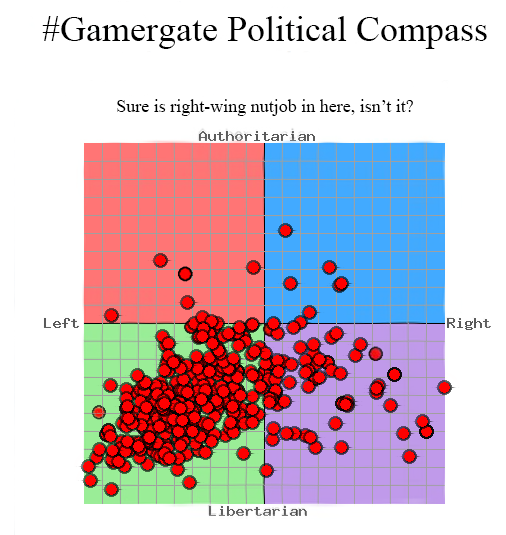I published a 'think piece' on gamergate over at the research side of the website yesterday. I argued that the pro-gamergate side was likely to lose because the left usually wins (for good or bad) on cultural issues:
Gamergate is one of the most interesting cultural issues that has appeared in years. It is a rare time that the losing side of the culture war has put up a good fight. But the anti-gamergate side will win, because Progress always wins. I’ll try and give a concise guide to gamergate, what’s at stake, where it came from, and why exactly it is that it will lose.
I read another good post on it from Cathy Young over at realclearpolitics—she made a different point to mine, trying to stress how it was not reasonable to characterise much of the movement as anti-women or misogynist, but simply taking an alternative (and she believes, valid) approach to improving the lot of women in gaming:
There are valid concerns, shared by at least some GamerGate supporters, about sex-based harassment in gaming groups and stereotypical portrayal of female characters in videogames. Unfortunately, critics of sexism in videogame culture tend to embrace a toxic brand of feminism that promotes antagonism, grievance, and intolerance of dissent, not equality or empowerment.
When I posted my piece on twitter I asked for constructive criticism, and one good point that was made is that, at least according to their own views of themselves and their results on political compass tests, gamergaters tend to lean left.

This makes me think that gamergate might be best characterised as a case of leftist infighting, but this time between Murray & Herrnstein's 'cognitive elites' that make up social justice anti-gamergate journalism and the broader constituency of more 'normal' pro-gamergate leftists holding more traditional leftist views. An open front in the war between New and old versions of what justice consists in.
This fits with my anecdotal experience that it is those (like Richard Dawkins) who are or have been associated with the left that experience most of their ire when they state or are suspected of having unacceptable views. As ever it's interesting to look at the parallel with religion, which abhors apostates much more zealously than infidels.
And it also fits with the modern left's de facto focus on race, gender, sexuality, (dis)ability as opposed to their previously overwhelming concern with economic exploitation or justice. As I said in the think piece:
Bear in mind that although social justice advocates do care about wealth disparities, this is far from their main concern, at least in terms of how they allocate their time. For example, insufficiently pro-transgender feminists will arouse large campaigns stopping them from giving lectures at many universities, while libertarian capitalists can speak freely. This is why I have argued that social justice is (a) a facet of neoliberalism, and (b) an artefact of the cognitive elite’s takeover of society. This is what makes the modern social justice movement so different.
This ends up working quite well for the ASI: we are quite comfortable with social progress as long as it allows for liberal economic policy, and only tend to object when social progress conflicts with more important goals such as free speech.


